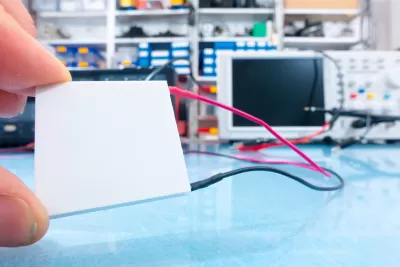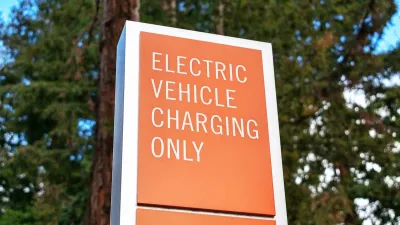Heat from industrial installations and buildings can be captured to create renewable electricity.

Scientists are working to develop devices that can harness waste heat from buildings and industrial uses to produce energy. As Muhammad Muddasar explains in The Conversation, most existing thermoelectric materials used to make such devices contain cadmium, lead, or mercury, toxic and often expensive substances.
Muddasar and other researchers at the University of Limerick and the University of Valencia have discovered a way to use wood-derived materials to convert waste heat. “This approach not only enhances energy efficiency, but also redefines how we view everyday materials as essential components of sustainable energy solutions.”
The research team used lignin, a byproduct of the paper industry, to convert low-temperature waste heat into electricity. “Since around 66% of industrial waste heat falls within this temperature range, this innovation presents a significant opportunity for eco-friendly energy solutions.”
In addition to capturing energy, thermoelectricity also requires storage solutions. Lignin-based porous carbon can also be used in supercapacitors to store energy. According to Muddasar, “This technology could find use in various settings, from providing power in remote areas to powering sensors and devices in everyday applications.”
FULL STORY: How waste heat could be captured and converted into green energy

Montreal Mall to Become 6,000 Housing Units
Place Versailles will be transformed into a mixed-use complex over the next 25 years.

Planetizen Federal Action Tracker
A weekly monitor of how Trump’s orders and actions are impacting planners and planning in America.

California High-Speed Rail's Plan to Right Itself
The railroad's new CEO thinks he can get the project back on track. The stars will need to align this summer.

Tenant Advocates: Rent Gouging Rampant After LA Wildfires
The Rent Brigade says it's found evidence of thousands of likely instances of rent gouging. In some cases, the landlords accused of exploiting the fires had made campaign donations to those responsible for enforcement.

Seattle’s Upzoning Plan is Ambitious, Light on Details
The city passed a ‘bare-bones’ framework to comply with state housing laws that paves the way for more middle housing, but the debate over how and where to build is just getting started.

DOJ Seeks to End USDOT Affirmative Action Program
The Disadvantaged Business Enterprise Program encouraged contracting with minority- and women-owned businesses in the transportation sector, where these groups are vastly underrepresented.
Urban Design for Planners 1: Software Tools
This six-course series explores essential urban design concepts using open source software and equips planners with the tools they need to participate fully in the urban design process.
Planning for Universal Design
Learn the tools for implementing Universal Design in planning regulations.
City of Camden Redevelopment Agency
City of Astoria
Transportation Research & Education Center (TREC) at Portland State University
City of Camden Redevelopment Agency
Municipality of Princeton (NJ)
Regional Transportation Commission of Southern Nevada





























